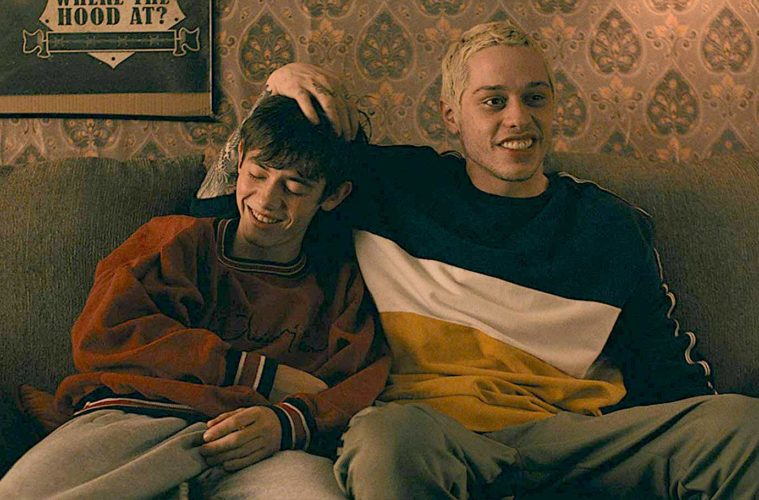Remember when you were a gawky teenager and older kids were like gods? You’d follow them to the depths of hell, just as long as they paid attention to you. But what if those gods turned out to be losers that led you down the wrong path? First time writer/director Jason Orley tackles this dangerous scenario with unhurried comic ease in Big Time Adolescence. The title of this 2019 Sundance Official Selection (on Hulu starting this Friday), isn’t necessarily a nod to its 16-year-old protagonist, Mo (Griffin Gluck) -who’s certainly struggling to navigate the torrential waters of puberty and budding maturity- it’s a reference to his best friend, Zeke (Pete Davidson), a 23-year-old, droopy-faced burnout who is a lot more infantile than his fledgling compatriot.
Orley’s debut is both endearing and funny but also a little scary — kind of like adolescence itself. Sure, being a teenager is romantic and not without its reveries, but you’re also trudging through uncharted territory, sidestepping quicksand every step of the way. In this case, the quicksand is a teenager’s insatiable need for role models. You could say Big Time Adolescence is like the indie comedy version of A Bronx Tale, although Pete Davidson’s character is far from a smooth mafia criminal.
So, how does an ungainly high school kid like Mo become best friends with Zeke, a drug dealing miscreant who can barely make it to work at an appliance store? They meet years earlier when Zeke dates Mo’s older sister, Kate (Emily Arlook) and Mo’s a mere 10-year-old minnow in desperate need of masculine guidance. Zeke responds to Mo’s idol-worshiping gaze and quickly takes him under his wing. Kate quickly drops Zeke due to his erratic immaturity, but the two boys continue hanging out through their formative years. Now, Mo is a 16-year-old introvert with an insatiable crush on his classmate (Oona Laurence), devoid of any friends in his school and spending every weekend at Zeke’s house, gleefully watching him and his drugged-out 20-something friends get wasted. We know this can’t be good. Danger lurks around every corner. Mo is an impressionable kid and Zeke is far from an ideal role model.
Orley’s gifts as a filmmaker are clearly displayed in these opening scenes when he establishes Zeke and Mo’s bond and simply invites us into Zeke’s house: a smoky, debauched lair littered with tattered posters, bongs, empty beer cans and absurd “dude” banter. We become a part of Zeke’s world, and like all dangerous invitations, it’s not without its charisma and trappings. The best scenes in Big Time Adolescence take you back to that time when you worship your brother and his friends, stamping your feet to make yourself conspicuous. Take the scene when Mo finally kisses his teenage crush. Afterwards, he tells Zeke and his friends (one of whom is a dim, hysterical Machine Gun Kelly) that it was “with tongue.” Of course, they immediately call him “Tongue Daddy” and make the moniker permanent with a tattoo on his hairless chest.
The fun can’t last forever, though. Zeke is an overgrown, self-destructive man-child, and as his aimless world begins to crumble, he not only misleads Mo with horrible advice on how to grow up, but pushes him to sell drugs to his classmates. At first, this gets Mo some much craved attention in school, but soon the bad advice and drug-dealing detonates in his face, especially to the detriment of his concerned, albeit loving parents (Jon Cryer, Julia Murney). By the way, Cryer is great here. His dumbfounded reactions to Zeke’s remarkable stupidity are worth the watch alone.
Big Time Adolescence doesn’t break any new ground. The film’s narrative is pretty familiar, especially if you’ve sluiced through a ton of Sundance coming-of-age tales in the past 20 years. But who cares? Sometimes genuine storytelling is more consequential and interesting than the tenuous struggle to be original. Orley is a confident filmmaker with a great grasp of nuance. Let’s hope he sticks with humans and not superheroes because he’s great at dissecting their disastrous complexities.
Saturday Night Live cast member Davidson and newcomer Griffin Gluck share an onscreen chemistry that’s as infectious as it is touching. Without their bond, the movie wouldn’t carry any weight. Davidson might be best known for his former relationship with a pop star, but his performance in particular, is deceptively multilayered. With his thin frame, bug-eyes, sporadic energy and rapid-fire sarcasm, his Zeke carries a hefty self-righteous nihilism, as if he’s battling the conventions of the world. Sure, he’s funny and charming, but he’s also camouflaging a deep-seated insecurity and anguish. In those moments when Davidson lets his guard down and stares at us with a lingering, dark, mystified stare, we know he’s seriously adrift. We’ve all met dudes like Zeke. They’re the life of the party, childishly needy and tragically lovable. But ultimately, their charm only goes so far. At some point either our childhood heroes grow up, or we have to.
Advertising disclosure: We may receive compensation for some of the links in our stories. Thank you for supporting LA Weekly and our advertisers.

